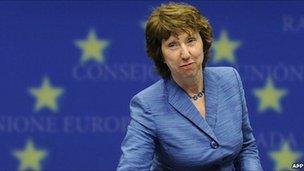EU marks new diplomatic territory
- Published

Lady Ashton is stepping through a minefield of national rivalry as she launches the new service
A new beast is lurking in the diplomatic jungle.
Nobody knows if it will swallow up its rivals or meet the fate of the dinosaurs.
It is called the European External Action Service, and is being trained to be the diplomatic arm of the European Union. It was formally approved by EU foreign ministers, external this week. However, key appointments are yet to be decided.
The EEAS, or EAS for short, is a creation of the Lisbon Treaty, external and is designed to move the international representation and effectiveness of the EU to a higher level.
The European Commission already has offices in almost every country around the world.
Mainly they administer trade and aid policies, two areas of rather unheralded and successful EU co-operation.
New EU muscle
So the EAS is not an entirely new concept. It builds on the existing structure and hugely expands it. Now, it is all going to be much grander.
The Commission offices will be transformed into diplomatic missions staffed by officials from the EU and national governments. There will be a rush for places, with an emphasis on geographical and gender balance.
The missions will report to the EU's High Representative for Foreign and Security Policy, which some people wanted to be called the EU's foreign minister. That was blocked by the British.
The new high representative will not make policy. That remains with the member states and depends on consensus.
But this is a much stronger post than it was, in that he or she - and the first one is a she, Baroness Ashton - will not only speak for the EU on agreed policies, as before, but will now also control the EU's aid budget and will have the new diplomatic service at her command.
Integration agenda
There is the potential for co-operation, but also the potential for clashes.
Lady Ashton wrote in the Wall Street Journal: "To respond to challenges that are global and complex, only integrated strategies will do.
"The value of the EAS will lie in its being able to bring together the many levers of influence that the European Union has - economic and political, plus civil and military crisis management tools - in support of a single political strategy.
"This is not, as some critics say, a grab for power; but it is, unashamedly, a grab for effectiveness."
Those in favour of greater European integration think the EAS has positive long-term implications.
Veteran EU observer John Palmer, who is on the advisory board of the think-tank the Federal Trust, said: "Most member states recognise that, while major disagreements are possible, in a multi-polar world there are forces pushing for EU policy to work in a much more co-ordinated way.
"This therefore is more than rhetoric. The process of European integration continues, even as we are disappointed at the response of institutions to the recent economic crisis. It is unfashionable to say so, but despite all the drama and chaos, integration is moving forward.
"Then there is money. There is not enough for everyone to fund their own comprehensive diplomatic service," Mr Palmer said.
However, some traditional diplomats are not convinced that the EAS will amount to much.
Sir Christopher Meyer, whose last post was as British ambassador in Washington, said: "This is of course not the end of national diplomacy.
"There is rhetoric and there is reality. The reality is that big EU states and many smaller ones still consider control of national foreign policy to be an indispensable aspect of sovereignty. They will not give it up anytime soon.
"The EAS has things to do in some areas where there is a common policy denominator, especially external trade. And there are potential economies of scale. We could sometimes squeeze into the same building.
"But expectations should not be set too high. This will not lead to a great deal of difference, if any."